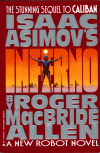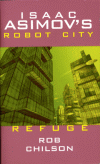- A robot may not injure a human being.
- A robot must cooperate with human beings except where such cooperation would conflict with the First Law.
- A robot must protect its own existence, as long as such protection does not conflict with the First Law.
- A robot may do as it likes, except where such action would violate the First, Second, or Third Laws.
About a year has passed since Caliban was exonerated. The Limbo project is currently using the New Law robots developed by Freda Leving in the hopes of fixing the terraforming problem. Although these robots are equipped with range restrictors to limit them to the island, an illicit smuggling trade has developed which smuggles robots out of Purgatory and helps remove the supposedly infallible restrictors. This criminal enterprise has caused much strain between Spacers and Settlers.
In the hopes of asserting his authority, Governor Chanto Grieg has decided to throw a party his mansion which is located on Purgatory, the home of the Limbo project and the New Law robots. Aside from the grounds of the mansion, the Settlers control the rest of the island. As an act of diplomacy all robots besides are banned from the party and all security is handled by the Governor’s Rangers and Settler Security Service. This of course causes great concern for Alvar Kresh, the Sheriff of Hades. He doesn’t have any authority outside of the city of Hades and thinks that security without robots is a big mistake. Caliban and the New Law robot leader Prospero intend to plead with Governor Grieg after the party.
Unfortunately, Caliban and Prospero appear to be the last to see the Governor alive. With Calaban’s lack of any Laws, he becomes a prime suspect. Also, since Prospero is under no compulsion to prevent any harm to humans, he is also suspected. I had expected another hunt like what occurred back in the last book, but this time the investigation took the form of a more traditional mystery. Alvar Kresh seems to have more faith in the robots than anyone else. Most of the twists and turns don’t seem related until the very end of the book where Kresh gets his brief moment of insight. I was a bit bothered at how quickly and neatly everything was laid out and explained using various clues that Kresh pieced together. With that said, most of the clues are pretty obvious once you think back except for the key one which tied everything together.
While the investigation takes its course there are a couple of passages which I enjoyed. Donald (robot DNL-111) brings up some interesting problems with the Fourth New Law in Chapter 11. He argues that this law causes robots to create desires to consume free time. Possibly this is the reason that many of the New Law robots are trying to flee Purgatory. Roger MacBride Allen appears to be setting himself up with ambiguous Laws in order to exploit them just like Asimov did. In Chapter 11 Caliban and Prospero argue over the requirements for a being to have the right to freedom. Where does one draw the line?
Overall, I think that this was a pretty good book, but I enjoyed the last one a little bit more. I was expecting a lot more focus on robots, but found that the majority of the book covered the various aspects of the Spacer and Settler political conflicts. I’m looking forward to Utopia, since from what I remember focused more on the New Law robots.



